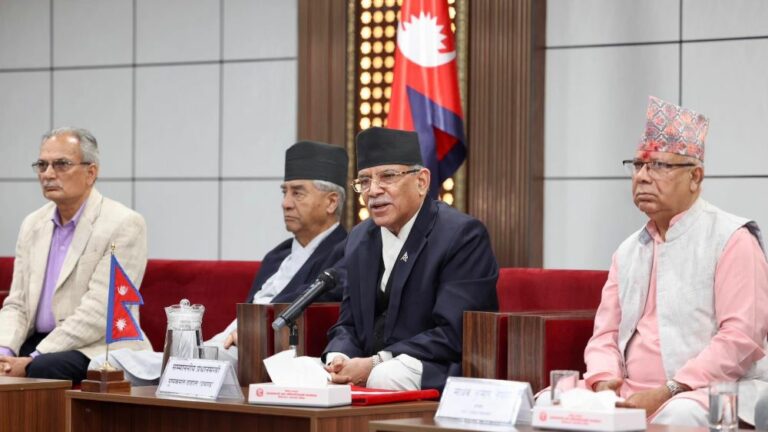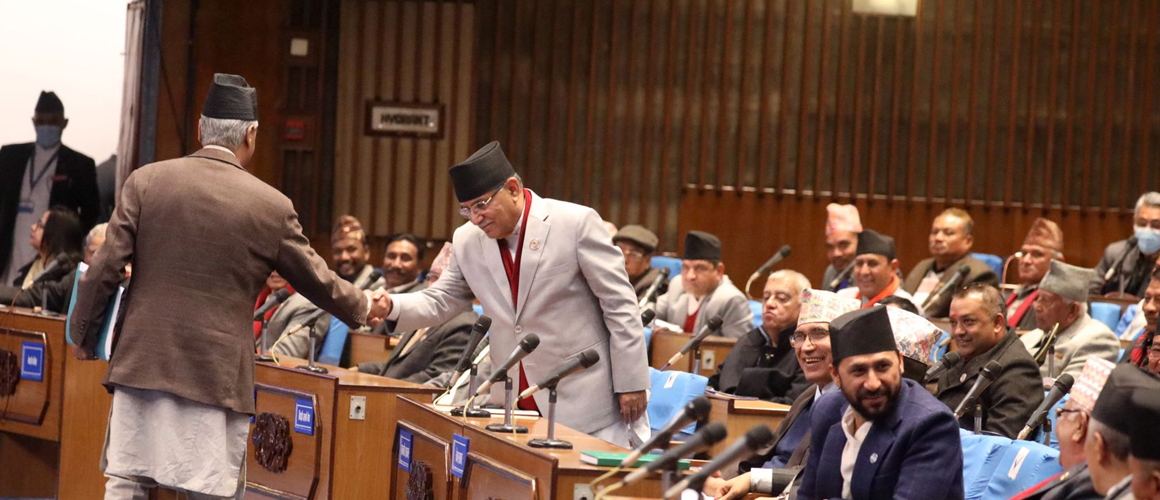Comment: Kathmandu 23 June : The coalition government, including the Nepali Congress and the Maoist Center, among other parties, is active in the country. However, the effectiveness of these parties is limited. They have not been able to reach a decisive point on resolving the issues among themselves.
There is little cooperation observed among the parties, but there is a significant amount of animosity.
Initially, Sher Bahadur Deuba, the President of the Nepali Congress, did not ready to proposed to hand over the leadership of the coalition government to Pushpa Kamal Dahal “Prachanda,” the Chairman of the Maoist Center, Prachanda was eager to replace Deuba. Prachanda’s intention was understood by Deuba. With the support of KP Sharma Oli, the Chairman of the Nepal Communist Party (UMl) Prachanda became successful in becoming the Prime Minister. Prachanda’s conclusion was that this time he did not become the Prime Minister, and there is no trust for another time.
In a short time, the Maoist-led government gained the support of the Congress in the name of national consensus. Currently, the Prachanda-led government is “functioning well.” The government has revealed scandals related to sending Nepali citizens as Bhutanese refugees to the United States. Many irregularities have been exposed. The true colors of political leaders have been revealed. Only the “final showdown” of the Bhutanese refugee issue remains.This government has a lot of work to do.

Currently, there is internal conflict, disputes, and a wave of dissatisfaction within the Congress. The demand for power struggle is the cause of the conflict. It is not a new issue for the political arena to have conflicts. It is said that the party leadership has suppressed the voice of youth power. Many want to hear that voice. However, it is not currently possible.
Deuba is seen as having a simple nature, but he is a cunning politician. He became the Prime Minister for the first time in 2052 B.S. Since then, the Congress has remained the same in terms of change.
From 2052 to 2059, Deuba faced a politically risky period. In Asar 2059 (June/July 2002), the Nepali Congress split, and he became separated from the party.
Since 2047, during Nepal’s constitutional monarchy and multiparty democracy, the political dynamics between the then Nepali Congress President Girija Prasad Koirala and his notable protégé and the current President Deuba were at play. Koirala wanted to oust Deuba, and in that government, Koirala was the Prime Minister, while Deuba held the position of Home Minister.
During the restoration of parliamentary democracy and constitutional monarchy or after the advent of federal democratic republicanism, political leaders of Nepal’s political parties could neither recognize the new era nor accurately assess the political environment in the changed circumstances. The leaders never made any serious attempt to establish and maintain internal mechanisms of parliamentary democracy with constitutional monarchy. The trend of viewing political events through the prism of the Durbar (Royal palace) did not end. Even after 2052, a critical political situation arose due to the encroachment of the King and his supporters, but both the Congress and Communist party leadership never took it seriously.
After the change in 2017, BS King Mahendra put his brothers, the royal priests, and trusted persons in charge of a non-partisan Panchayat system of governance. At that time, the leaders who were within the country, fighting for democracy, did not find the opportunity to resist the King’s defensive conspiracies. The leaders of Congress and the leftist parties, who spent three decades demanding ‘constitutional monarchy ‘and ‘parliamentary democracy’, were more engrossed in the opportunities of 2046 BS than the requirements. They failed to grasp the dangerous goal of the regressive politics.
To make the J’an Andolan’ of 2046 BS more dynamic, Congress and Communist leaders and activists got trapped in the cycle of power struggles. Sometimes they were stuck in the net of Panchayat leader Surya Bahadur Thapa, and at other times, they were caught in the noose of Lokendra Bahadur Chand’s bell. The constitutional monarchy and the multiparty democracy established in 2047BS, aiming to remove fear and doubts from the minds of the people, couldn’t fully gain the trust of the Nepali peoples.
After the political changes in 2047BS, Congress achieved a majority in the parliamentary elections but couldn’t secure it. The constitutional transformation that took place after the establishment of the constitution lasted for four years. Prime Minister Koirala dissolved his own party’s majority-formed “unity” government and announced midterm elections. The announcement of midterm elections created divisions within the Congress.
In the parliamentary elections, the main opposition party, the CPN (UML), emerged as the largest party. Congress secured the second position.
The political life of Congress President Deuba witnessed a critical period during the assumption of power in 2052BS. From 2052 to 2059, he was surrounded by political turmoil. Before that, with the demise of King Birendra’s lineage and the declaration of the death of Prince Dipendra, along with the establishment of King Gyanendra’s reign and similar events, there are still some mysteries to be unraveled.
Political parties have initiated a new political transition towards the federal democratic republic since the election of the Constituent Assembly, leading to the constitutional structure. However, the implementation process has faced significant challenges.
Political leaders who claim to fight against the political instability and corruption themselves have been engulfed in the swamp of instability and corruption. Seeing the hypocrisy of these leaders, the people have become disillusioned, and those standing against the democratic republic resort to violence.
If we analyze the current political situation based on this, it can be said that corruption cannot be eradicated solely in this context. Sociologists argue that only the purification of the foundation of politics can remove corruption from the country. For such purification, the personalities in leadership roles need to exhibit a greater sense of responsibility.




COMMENTS